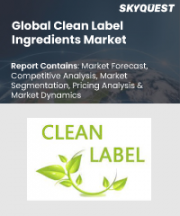
|
시장보고서
상품코드
1817968
클린 라벨 스낵 시장 예측(-2032년) : 제품, 원료 유형, 형태, 용도, 유통 채널, 지역별 분석Clean Label Snacks Market Forecasts to 2032 - Global Analysis By Product (Baked Snacks, Extruded Snacks, Nuts & Seeds, and Bars & Mixes), Ingredient Type, Form, Application, Distribution Channel and By Geography |
||||||
Stratistics MRC에 따르면 세계의 클린 라벨 스낵 시장은 2025년 65억 달러를 차지하고 예측 기간 동안 CAGR은 6.4%로 성장해 2032년까지 101억 달러에 이를 전망입니다.
클린 라벨 스낵이란, 인공 첨가물, 보존료, 착색료를 사용하지 않고, 간단하고 인식하기 쉽고, 가공을 최소한으로 억제한 원재료를 사용한 패키지 식품입니다. 투명성을 중시하고, 소비자에게 명확한 표시와 건강 지향의 라이프 스타일에 영향을 주는 자연적인 조성을 제공합니다. 예를 들어, 그래놀라 바, 베이크드 칩, 전곡, 씨앗, 과일을 사용한 견과류 믹스 등이 있습니다. 클린 라벨 스낵은 일상적인 간식 선택에 있어서 건전한 영양, 알레르겐을 배려한 제조, 윤리적인 조달에 대한 기호와 일치하며, 진짜 지향의 고조에 부응하는 것입니다.
FDA의 자발적인 '건강한' 라벨링 이니셔티브에 따르면 보다 단순한 원료, 인공 첨가물 미사용, 영양가 높은 간식을 요구하는 목소리가 커지고 있습니다.
투명성에 대한 소비자의 요구 증가
투명성을 요구하는 소비자 요구 증가는 클린 라벨 스낵 채택에 박차를 가하고 있습니다. 소비자는 인공 첨가물, 보존료, 합성 향료를 포함하지 않는 간식을 찾고 건강 지향의 향상과 보조를 맞추고 있습니다. 투명한 디스플레이 방법은 고객에게 제품의 신뢰성을 안심시키고 브랜드 충성도를 강화합니다. 소매업체나 제조업체는 "비유전자 재조합" "유기농" "인공 성분 미사용" 이라고 하는 깨끗한 주장을 강조하고 있습니다. 이러한 소비자 주도의 개방성과 진정성의 추구는 계속해서 시장의 주요 성장 요인이 되고 있습니다.
천연 깨끗한 원료의 높은 비용
천연 소재나 가공도가 낮은 소재를 사용하면 클린 라벨 스낵의 제조 비용이 크게 상승합니다. 고품질 원료를 조달하고, 인증을 유지하며, 지속 가능한 농법을 채택하는 데 비용이 많이 듭니다. 중소규모의 생산자는 기존의 스낵 브랜드에 비해 경쟁력 있는 가격 설정에 어려움을 겪고 있습니다. 또한 원재료비 인플레이션 압력은 과제를 악화시켜 가격에 민감한 시장 입수를 제한하고 있습니다. 건강 지향이 커지고 있음에도 불구하고 소비자는 더 저렴한 대체품을 선택할 수 있기 때문에 이 비용 장벽은 광범위한 보급을 억제하고 시장 성장 궤도를 둔화시키고 있습니다.
학교 및 직장의 영양 프로그램에 진입
학교 및 직장의 영양 프로그램에 진입하는 것은 클린 라벨 스낵에 큰 기회입니다. 학교나 직장에서는 건강 증진을 위해 보다 건강한 식품 정책을 채용하는 경향이 강해지고 있어, 무첨가인 자연 스낵은 매력적인 선택이 되고 있습니다. 정부 프로그램이나 기업의 웰니스 이니셔티브와 제휴함으로써 시장 확대를 기대할 수 있습니다. 어린이와 전문가를 대상으로 분량이 제한되고 영양 균형 잡힌 간식을 제공함으로써 수용 태세가 강화됩니다. 의료기관이 예방위생과 가공식품 소비 절감을 우선하는 가운데, 클린 라벨 스낵 브랜드는 발판을 굳히고 판매량 증가와 주류 상품 채용을 촉진합니다.
원재료 부족으로 인한 생산 혼란
원료 부족은 클린 라벨 스낵 시장의 주요 위협이며, 생산을 혼란스럽게 하고 공급의 일관성을 제한합니다. 자연농법이나 유기농법에 대한 의존은 계절적 변동이 많기 때문에 날씨 변동, 지정학적 문제, 공급망의 혼란 등의 영향을 받기 쉽습니다. 천연 감미료, 식물성 단백질, 유기 곡물의 부족은 생산 일정과 비용에 직접 영향을 미칩니다. 공급 부족이 길어지면 가격 상승과 제품 공급력 저하로 이어져 브랜드 평판과 시장 안정성이 저하될 수 있습니다. 이러한 외부 위험은 업계의 탄력성에 여전히 중요한 요소입니다.
COVID-19의 영향:
COVID-19의 대유행은 스낵의 소비 패턴을 재구축했고, 당초에는 공급망과 소매 판매에 혼란이 생겼습니다. 그러나 건강에 대한 의식이 높아졌고, 보다 안전하고 영양가 있는 클린 라벨 제품에 대한 수요가 높아졌습니다. 소비자는 폐쇄 기간 동안 면역력을 높이는 유기농 천연 소재의 간식을 요구했습니다. 전자상거래 플랫폼이 중요한 판매 채널이 되어 클린 라벨 브랜드의 디지털화가 가속화되었습니다. 조달과 유통의 단기적인 과제에도 불구하고, 유행은 장기적인 성장을 뒷받침했고, 클린 라벨 스낵은 유행 후 건강 지향적 인 식생활에 필수적이었습니다.
베이크도 스낵 분야는 예측기간 중 최대가 될 전망
베이크드 스낵 분야는 튀김 제품을 대체하는 건강한 대체품으로서의 인식이 강하기 때문에 시장 점유율을 독점할 것으로 예측됩니다. 소비자는 유분이 적고 깨끗한 배합의 구운 칩, 크래커, 바를 선호합니다. 각 브랜드는 최소한의 원료와 영양가를 보여줌으로써 투명성을 강조합니다. 게다가 베이크드 스낵은 글루텐 프리나 식물 유래 동향과 궁합이 좋고, 폭넓은 층에 어필할 수 있습니다. 베이크드 스낵은 맛 혁신의 다양성과 소매점에서의 가용성 확대로 클린 라벨의 주요 범주로 남아 있습니다.
천연 착색료 분야는 예측 기간 중 가장 높은 CAGR이 예상됩니다.
예측기간 동안 합성첨가물 분리 증가에 힘입어 천연 착색료 분야가 가장 높은 성장률을 보일 것으로 예측됩니다. 소비자와 규제 당국은 식물, 과일, 야채에서 얻은 생생하면서도 자연적인 대체품을 점점 더 요구하고 있습니다. 제조업체는 제품의 신뢰성을 유지하면서 시각적 매력을 높이기 위해 천연 착색제를 채택합니다. 인공 착색료와 관련된 잠재적인 건강 위험에 대한 의식이 증가함에 따라 대안을 더욱 강화하고 있습니다. 세계 브랜드에서 클린 라벨에 대한 노력이 강화됨에 따라 천연 착색료는이 시장에서 빠르게 확대되는 하위 부문이됩니다.
최대 점유율을 차지하는 지역:
예측 기간 동안 아시아태평양이 가장 큰 시장 점유율을 차지할 것으로 예상되지만, 이는 건강 의식 증가, 도시화, 식생활의 기호의 진화로 인한 것입니다. 중국, 인도, 일본 등 국가에서는 자연스럽고 가공도가 낮은 스낵 수요가 급증하고 있습니다. 중산 계급의 인구 증가와 소매점의 보급이 보급을 뒷받침하고 있습니다. 현지 기업은 문화적으로 적절한 클린 라벨 스낵을 제공함으로써 혁신을 도모하고 있으며 지역 성장을 강화하고 있습니다. 또한 식품의 안전성과 영양을 추진하는 정부의 적극적인 노력이 시장 확대를 가속화하고 아시아태평양의 리더로서의 지위를 확고하게 하고 있습니다.
CAGR이 가장 높은 지역:
예측 기간 동안 북미는 투명성, 웰빙, 지속 가능한 식품 생산에 대한 소비자의 왕성한 수요에 따라 가장 높은 CAGR을 나타낼 것으로 예측됩니다. 이 지역은 확립된 클린 라벨 규정, 높은 구매력, 유기적이고 자연적인 원료에 대한 폭넓은 선호도 등의 혜택을 누리고 있습니다. 주요 브랜드와 신흥 기업은 글루텐 프리, 채식주의자, 단백질이 풍부한 간식 등 진화하는 식생활의 요구에 대응하기 위해 적극적인 기술 혁신을 실시했습니다. 슈퍼마켓, 건강식품점, 전자상거래를 통해 유통이 확대되어 접근성이 강화되고 있습니다. 이러한 수요, 혁신, 소비자 신뢰의 견고한 생태계로 인해 북미는 가장 급성장하는 지역이 되었습니다.
무료 주문을 받아서 만드는 서비스:
이 보고서를 구독하는 고객은 다음 무료 맞춤설정 옵션 중 하나를 사용할 수 있습니다.
- 기업 프로파일
- 추가 시장 기업의 종합적 프로파일링(3개사까지)
- 주요 기업의 SWOT 분석(3개사까지)
- 지역 세분화
- 고객의 관심에 응한 주요국 시장 추계, 예측 및 CAGR(주: 타당성 확인에 따름)
- 경쟁 벤치마킹
- 제품 포트폴리오, 지리적 존재, 전략적 제휴에 기반한 주요 기업 벤치마킹
목차
제1장 주요 요약
제2장 서문
- 개요
- 이해관계자
- 조사 범위
- 조사 방법
- 데이터 마이닝
- 데이터 분석
- 데이터 검증
- 조사 접근
- 조사 자료
- 1차 조사 자료
- 2차 조사 정보원
- 전제조건
제3장 시장 동향 분석
- 성장 촉진요인
- 억제요인
- 기회
- 위협
- 제품분석
- 용도 분석
- 신흥 시장
- COVID-19의 영향
제4장 Porter's Five Forces 분석
- 공급기업의 협상력
- 구매자의 협상력
- 대체품의 위협
- 신규 참가업체의 위협
- 경쟁 기업간 경쟁 관계
제5장 세계의 클린 라벨 스낵 시장 : 제품별
- 베이크드 과자
- 압출 스낵
- 견과류 및 씨앗
- 바 및 믹스
제6장 세계의 클린 라벨 스낵 시장 : 원료 유형별
- 천연색소
- 천연 향료
- 과일 및 채소 원료
- 천연 감미료 및 전분
- 기타 원료 유형
제7장 세계의 클린 라벨 스낵 시장 : 형태별
- 건조
- 액체
제8장 세계의 클린 라벨 스낵 시장 : 용도별
- 음료
- 조리된 식품
- 냉동 디저트
- 소스 및 조미료
제9장 세계의 클린 라벨 스낵 시장 : 유통 채널별
- 슈퍼마켓 및 하이퍼마켓
- 편의점
- 온라인 소매 및 E-Commerce
- 기타 유통 채널
제10장 세계의 클린 라벨 스낵 시장 : 지역별
- 북미
- 미국
- 캐나다
- 멕시코
- 유럽
- 독일
- 영국
- 이탈리아
- 프랑스
- 스페인
- 기타 유럽
- 아시아태평양
- 일본
- 중국
- 인도
- 호주
- 뉴질랜드
- 한국
- 기타 아시아태평양
- 남미
- 아르헨티나
- 브라질
- 칠레
- 기타 남미
- 중동 및 아프리카
- 사우디아라비아
- 아랍에미리트(UAE)
- 카타르
- 남아프리카
- 기타 중동 및 아프리카
제11장 주요 발전
- 계약, 파트너십, 협업, 합작투자
- 인수와 합병
- 신제품 발매
- 사업 확대
- 기타 주요 전략
제12장 기업 프로파일링
- Nestle SA
- PepsiCo Inc.
- The Kellogg Company
- General Mills Inc.
- Mondelez International Inc.
- The Hershey Company
- Danone SA
- Unilever PLC
- Hormel Foods Corporation
- Conagra Brands Inc.
- Tyson Foods Inc.
- Campbell Soup Company
- Archer Daniels Midland Company
- Ingredion Incorporated
- Hain Celestial Group Inc.
- SunOpta Inc.
- Bunge Limited
- Kerry Group PLC
According to Stratistics MRC, the Global Clean Label Snacks Market is accounted for $6.5 billion in 2025 and is expected to reach $10.1 billion by 2032 growing at a CAGR of 6.4% during the forecast period. Clean label snacks are packaged food products formulated with simple, recognizable, and minimally processed ingredients free from artificial additives, preservatives, or colors. They prioritize transparency, offering consumers clear labeling and natural compositions that resonate with health-conscious lifestyles. Examples include granola bars, baked chips, and nut mixes made with whole grains, seeds, or fruits. Clean label snacks cater to rising demand for authenticity, aligning with preferences for wholesome nutrition, allergen-conscious production, and ethical sourcing in everyday snacking choices.
According to the FDA's voluntary "healthy" labeling initiative, there is a significant push for snacks with simpler ingredients, no artificial additives, and meaningful nutritional benefits.
Market Dynamics:
Driver:
Rising consumer demand for transparency
Growing consumer demand for transparency is fueling the adoption of clean label snacks, as buyers increasingly prioritize ingredient clarity and natural sourcing. Shoppers seek snacks free from artificial additives, preservatives, and synthetic flavors, aligning with rising health-conscious lifestyles. Transparent labeling practices reassure customers about product authenticity, strengthening brand loyalty. Retailers and manufacturers emphasize clean claims such as "non-GMO," "organic," and "no artificial ingredients." This consumer-driven push for openness and authenticity continues to be a key growth driver for the market.
Restraint:
High cost of natural, clean ingredients
The use of natural and minimally processed ingredients significantly raises production costs for clean label snacks. Sourcing high-quality raw materials, maintaining certifications, and adopting sustainable farming practices add expense. Small and medium-sized producers struggle with competitive pricing compared to conventional snack brands. Moreover, inflationary pressures on raw material costs exacerbate the challenge, limiting accessibility in price-sensitive markets. This cost barrier restrains broader adoption, as consumers may opt for cheaper alternatives despite rising health consciousness, slowing down the market's growth trajectory.
Opportunity:
Entry into school and workplace nutrition programs
Expanding into institutional nutrition programs presents a major opportunity for clean label snacks. Schools and workplaces are increasingly adopting healthier food policies to promote wellness, making natural, additive-free snacks attractive alternatives. Partnerships with government programs and corporate wellness initiatives can broaden market reach. Providing portion-controlled, nutritionally balanced snacks tailored for children and professionals enhances acceptance. As institutions prioritize preventive health and reduced processed food consumption, clean label snack brands gain a strong foothold, driving volume growth and mainstream adoption.
Threat:
Ingredient shortages disrupting production
Ingredient shortages represent a key threat to the clean label snacks market, disrupting production and limiting supply consistency. Reliance on natural and organic farming, often seasonal, makes sourcing vulnerable to weather fluctuations, geopolitical issues, and supply chain disruptions. Shortfalls in natural sweeteners, plant proteins, or organic grains directly impact production timelines and costs. Prolonged shortages could lead to price surges and reduced product availability, challenging brand reputation and market stability. This external risk remains a critical factor for industry resilience.
Covid-19 Impact:
The COVID-19 pandemic reshaped snack consumption patterns, with initial disruptions in supply chains and retail sales. However, health awareness surged, driving demand for clean label products perceived as safer and more nutritious. Consumers sought snacks with immunity-boosting, organic, and natural ingredients during lockdowns. E-commerce platforms became crucial sales channels, accelerating digital adoption among clean label brands. Despite short-term challenges in sourcing and distribution, the pandemic ultimately reinforced long-term growth, positioning clean label snacks as an essential part of post-pandemic health-conscious diets.
The baked snacks segment is expected to be the largest during the forecast period
The baked snacks segment is projected to dominate the market share, resulting from its strong perception as a healthier alternative to fried products. Consumers prefer baked chips, crackers, and bars due to reduced oil content and clean formulations. Brands emphasize transparency by showcasing minimal ingredients and nutritional benefits. Moreover, baked snacks align well with gluten-free and plant-based trends, expanding appeal across demographic groups. Their versatility in flavor innovation and growing retail availability ensure baked snacks remain the leading clean label category.
The natural colors segment is expected to have the highest CAGR during the forecast period
Over the forecast period, the natural colors segment is predicted to witness the highest growth rate, propelled by the rising shift away from synthetic additives. Consumers and regulators increasingly demand vibrant yet natural alternatives sourced from plants, fruits, and vegetables. Manufacturers adopt natural colors to enhance visual appeal while maintaining product authenticity. Growing awareness of potential health risks linked to artificial colors further drives replacement. As clean label commitments strengthen across global brands, natural colors become a fast-expanding subsegment within this market.
Region with largest share:
During the forecast period, the Asia Pacific region is expected to hold the largest market share, attributed to rising health awareness, urbanization, and evolving dietary preferences. Countries like China, India, and Japan are witnessing a surge in demand for natural, minimally processed snacks. Expanding middle-class populations, coupled with growing retail penetration, support strong adoption. Local players are innovating with culturally relevant clean label snack offerings, strengthening regional growth. Additionally, supportive government initiatives promoting food safety and nutrition accelerate market expansion, cementing Asia Pacific's leadership position.
Region with highest CAGR:
Over the forecast period, the North America region is anticipated to exhibit the highest CAGR associated with strong consumer demand for transparency, wellness, and sustainable food production. The region benefits from well-established clean label regulations, high purchasing power, and widespread preference for organic, natural ingredients. Major brands and startups actively innovate to meet evolving dietary needs, including gluten-free, vegan, and protein-rich snacks. Expanding distribution through supermarkets, health stores, and e-commerce strengthens accessibility. This robust ecosystem of demand, innovation, and consumer trust positions North America as the fastest-growing region.
Key players in the market
Some of the key players in Clean Label Snacks Market include Nestle S.A., PepsiCo Inc., The Kellogg Company, General Mills Inc., Mondelez International Inc., The Hershey Company, Danone S.A., Unilever PLC, Hormel Foods Corporation, Conagra Brands Inc., Tyson Foods Inc., Campbell Soup Company, Archer Daniels Midland Company, Ingredion Incorporated, Hain Celestial Group Inc., SunOpta Inc., Bunge Limited, and Kerry Group PLC.
Key Developments:
In Sep 2025, PepsiCo Inc. (under the Frito-Lay brand) launched "Simple Farms," a line of potato chips cooked in avocado oil with only three ingredients: potatoes, avocado oil, and sea salt, meeting non-GMO and clean label certifications.
In Aug 2025, General Mills Inc. introduced "Annie's Clear Kitchen" crackers, made with 100% organic ancient grains and visible seeds, using a unique fermentation process to enhance flavor without artificial leavening agents or preservatives.
In July 2025, The Hain Celestial Group Inc. announced "Earth's Best Organic Toddler Yogis," a freeze-dried yogurt snack sweetened only with fruit juice concentrates and containing no added sugars, artificial colors, or synthetic ingredients.
Products Covered:
- Baked Snacks
- Extruded Snacks
- Nuts & Seeds
- Bars & Mixes
Ingredient Types Covered:
- Natural Colors
- Natural Flavors
- Fruit & Vegetable Ingredients
- Natural Sweeteners & Starches
- Other Ingredient Types
Forms Covered:
- Dry
- Liquid
Applications Covered:
- Beverages
- Ready Meals
- Frozen Desserts
- Sauces & Condiments
Distribution Channels Covered:
- Supermarkets/Hypermarkets
- Convenience Stores
- Online Retail/E-commerce
- Other Distribution Channels
Regions Covered:
- North America
- US
- Canada
- Mexico
- Europe
- Germany
- UK
- Italy
- France
- Spain
- Rest of Europe
- Asia Pacific
- Japan
- China
- India
- Australia
- New Zealand
- South Korea
- Rest of Asia Pacific
- South America
- Argentina
- Brazil
- Chile
- Rest of South America
- Middle East & Africa
- Saudi Arabia
- UAE
- Qatar
- South Africa
- Rest of Middle East & Africa
What our report offers:
- Market share assessments for the regional and country-level segments
- Strategic recommendations for the new entrants
- Covers Market data for the years 2024, 2025, 2026, 2028, and 2032
- Market Trends (Drivers, Constraints, Opportunities, Threats, Challenges, Investment Opportunities, and recommendations)
- Strategic recommendations in key business segments based on the market estimations
- Competitive landscaping mapping the key common trends
- Company profiling with detailed strategies, financials, and recent developments
- Supply chain trends mapping the latest technological advancements
Free Customization Offerings:
All the customers of this report will be entitled to receive one of the following free customization options:
- Company Profiling
- Comprehensive profiling of additional market players (up to 3)
- SWOT Analysis of key players (up to 3)
- Regional Segmentation
- Market estimations, Forecasts and CAGR of any prominent country as per the client's interest (Note: Depends on feasibility check)
- Competitive Benchmarking
- Benchmarking of key players based on product portfolio, geographical presence, and strategic alliances
Table of Contents
1 Executive Summary
2 Preface
- 2.1 Abstract
- 2.2 Stake Holders
- 2.3 Research Scope
- 2.4 Research Methodology
- 2.4.1 Data Mining
- 2.4.2 Data Analysis
- 2.4.3 Data Validation
- 2.4.4 Research Approach
- 2.5 Research Sources
- 2.5.1 Primary Research Sources
- 2.5.2 Secondary Research Sources
- 2.5.3 Assumptions
3 Market Trend Analysis
- 3.1 Introduction
- 3.2 Drivers
- 3.3 Restraints
- 3.4 Opportunities
- 3.5 Threats
- 3.6 Product Analysis
- 3.7 Application Analysis
- 3.8 Emerging Markets
- 3.9 Impact of Covid-19
4 Porters Five Force Analysis
- 4.1 Bargaining power of suppliers
- 4.2 Bargaining power of buyers
- 4.3 Threat of substitutes
- 4.4 Threat of new entrants
- 4.5 Competitive rivalry
5 Global Clean Label Snacks Market, By Product
- 5.1 Introduction
- 5.2 Baked Snacks
- 5.3 Extruded Snacks
- 5.4 Nuts & Seeds
- 5.5 Bars & Mixes
6 Global Clean Label Snacks Market, By Ingredient Type
- 6.1 Introduction
- 6.2 Natural Colors
- 6.3 Natural Flavors
- 6.4 Fruit & Vegetable Ingredients
- 6.5 Natural Sweeteners & Starches
- 6.6 Other Ingredient Types
7 Global Clean Label Snacks Market, By Form
- 7.1 Introduction
- 7.2 Dry
- 7.3 Liquid
8 Global Clean Label Snacks Market, By Application
- 8.1 Introduction
- 8.2 Beverages
- 8.3 Ready Meals
- 8.4 Frozen Desserts
- 8.5 Sauces & Condiments
9 Global Clean Label Snacks Market, By Distribution Channel
- 9.1 Introduction
- 9.2 Supermarkets/Hypermarkets
- 9.3 Convenience Stores
- 9.4 Online Retail/E-commerce
- 9.5 Other Distribution Channels
10 Global Clean Label Snacks Market, By Geography
- 10.1 Introduction
- 10.2 North America
- 10.2.1 US
- 10.2.2 Canada
- 10.2.3 Mexico
- 10.3 Europe
- 10.3.1 Germany
- 10.3.2 UK
- 10.3.3 Italy
- 10.3.4 France
- 10.3.5 Spain
- 10.3.6 Rest of Europe
- 10.4 Asia Pacific
- 10.4.1 Japan
- 10.4.2 China
- 10.4.3 India
- 10.4.4 Australia
- 10.4.5 New Zealand
- 10.4.6 South Korea
- 10.4.7 Rest of Asia Pacific
- 10.5 South America
- 10.5.1 Argentina
- 10.5.2 Brazil
- 10.5.3 Chile
- 10.5.4 Rest of South America
- 10.6 Middle East & Africa
- 10.6.1 Saudi Arabia
- 10.6.2 UAE
- 10.6.3 Qatar
- 10.6.4 South Africa
- 10.6.5 Rest of Middle East & Africa
11 Key Developments
- 11.1 Agreements, Partnerships, Collaborations and Joint Ventures
- 11.2 Acquisitions & Mergers
- 11.3 New Product Launch
- 11.4 Expansions
- 11.5 Other Key Strategies
12 Company Profiling
- 12.1 Nestle S.A.
- 12.2 PepsiCo Inc.
- 12.3 The Kellogg Company
- 12.4 General Mills Inc.
- 12.5 Mondelez International Inc.
- 12.6 The Hershey Company
- 12.7 Danone S.A.
- 12.8 Unilever PLC
- 12.9 Hormel Foods Corporation
- 12.10 Conagra Brands Inc.
- 12.11 Tyson Foods Inc.
- 12.12 Campbell Soup Company
- 12.13 Archer Daniels Midland Company
- 12.14 Ingredion Incorporated
- 12.15 Hain Celestial Group Inc.
- 12.16 SunOpta Inc.
- 12.17 Bunge Limited
- 12.18 Kerry Group PLC



















